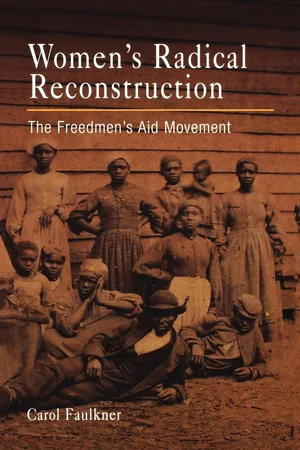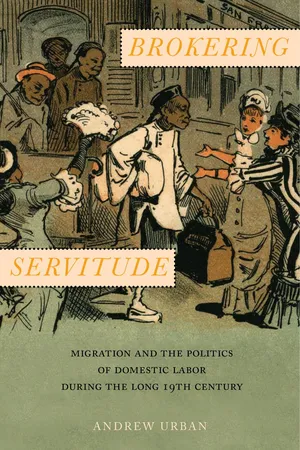History
The Freedmen's Bureau
The Freedmen's Bureau was a U.S. government agency established in 1865 to aid newly freed African Americans in the aftermath of the Civil War. It provided food, housing, medical care, and education, and also helped reunite families. The bureau played a crucial role in the transition from slavery to freedom for millions of African Americans.
Written by Perlego with AI-assistance
Related key terms
5 Key excerpts on "The Freedmen's Bureau"
- eBook - ePub
Three African-American Classics
Up from Slavery, The Souls of Black Folk and Narrative of the Life of Frederick Douglass
- W. E. B. Du Bois, Frederick Douglass, Booker T. Washington(Authors)
- 2012(Publication Date)
- Dover Publications(Publisher)
Evidently, Congress must soon legislate again on the hastily organized Bureau, which had so quickly grown into wide significance and vast possibilities. An institution such as that was well-nigh as difficult to end as to begin. Early in 1866 Congress took up the matter, when Senator Trumbull, of Illinois, introduced a bill to extend the Bureau and enlarge its powers. This measure received, at the hands of Congress, far more thorough discussion and attention than its predecessor. The war cloud had thinned enough to allow a clearer conception of the work of Emancipation. The champions of the bill argued that the strengthening of the Freedmen’s Bureau was still a military necessity; that it was needed for the proper carrying out of the Thirteenth Amendment, and was a work of sheer justice to the ex-slave, at a trifling cost to the government. The opponents of the measure declared that the war was over, and the necessity for war measures past; that the Bureau, by reason of its extraordinary powers, was clearly unconstitutional in time of peace, and was destined to irritate the South and pauperize the freedmen, at a final cost of possibly hundreds of millions. These two arguments were unanswered, and indeed unanswerable: the one that the extraordinary powers of the Bureau threatened the civil rights of all citizens; and the other that the government must have power to do what manifestly must be done, and that present abandonment of the freedmen meant their practical re-enslavement. The bill which finally passed enlarged and made permanent the Freedmen’s Bureau. It was promptly vetoed by President Johnson as “unconstitutional,” “unnecessary,” and “extrajudicial,” and failed of passage over the veto. Meantime, however, the breach between Congress and the President began to broaden, and a modified form of the lost bill was finally passed over the President’s second veto, July 16.The act of 1866 gave the Freedmen’s Bureau its final form, — the form by which it will be known to posterity and judged of men. It extended the existence of the Bureau to July, 1868; it authorized additional assistant commissioners, the retention of army officers mustered out of regular service, the sale of certain forfeited lands to freedmen on nominal terms, the sale of Confederate public property for Negro schools, and a wider field of judicial interpretation and cognizance. The government of the unreconstructed South was thus put very largely in the hands of the Freedmen’s Bureau, especially as in many cases the departmental military commander was now made also assistant commissioner. It was thus that the Freedmen’s Bureau became a full-fledged government of men. It made laws, executed them and interpreted them; it laid and collected taxes, defined and punished crime, maintained and used military force, and dictated such measures as it thought necessary and proper for the accomplishment of its varied ends. Naturally, all these powers were not exercised continuously nor to their fullest extent; and yet, as General Howard has said, “scarcely any subject that has to be legislated upon in civil society failed, at one time or another, to demand the action of this singular Bureau.”To understand and criticise intelligently so vast a work, one must not forget an instant the drift of things in the later sixties. Lee had surrendered, Lincoln was dead, and Johnson and Congress were at loggerheads; the Thirteenth Amendment was adopted, the Fourteenth pending, and the Fifteenth declared in force in 1870. Guerrilla raiding, the ever-present flickering after-flame of war, was spending its force against the Negroes, and all the Southern land was awakening as from some wild dream to poverty and social revolution. In a time of perfect calm, amid willing neighbors and streaming wealth, the social uplifting of four million slaves to an assured and self-sustaining place in the body politic and economic would have been a herculean task; but when to the inherent difficulties of so delicate and nice a social operation were added the spite and hate of conflict, the hell of war; when suspicion and cruelty were rife, and gaunt Hunger wept beside Bereavement, — in such a case, the work of any instrument of social regeneration was in large part foredoomed to failure. The very name of the Bureau stood for a thing in the South which for two centuries and better men had refused even to argue, — that life amid free Negroes was simply unthinkable, the maddest of experiments. - eBook - ePub
- W. E. B. Du Bois, Eugene F. Provenzo(Authors)
- 2015(Publication Date)
- Routledge(Publisher)
28 The opponents of the measure declared that the war was over, and the necessity for war measures past; that the Bureau, by reason of its extraordinary powers, was clearly unconstitutional in time of peace, and was destined to irritate the South and pauperize the freedmen, at a final cost of possibly hundreds of millions. These two arguments were unanswered, and indeed unanswerable: the one that the extraordinary powers of the Bureau threatened the civil rights of all citizens; and the other that the government must have power to do what manifestly must be done, and that present abandonment of the freedmen meant their practical re-enslavement. The bill which finally passed enlarged and made permanent the Freedmen’s Bureau. It was promptly vetoed by President Johnson as “unconstitutional,” “unnecessary,” and “extrajudicial,” and failed of passage over the veto. Meantime, however, the breach between Congress and the President began to broaden, and a modified form of the lost bill was finally passed over the President’s second veto, July 16.The act of 1866 gave the Freedmen’s Bureau its final form,—the form by which it will be known to posterity and judged of men. It extended the existence of the Bureau to July 1868; it authorized additional assistant commissioners, the retention of army officers mustered out of regular service, the sale of certain forfeited lands to freedmen on nominal terms, the sale of Confederate public property for Negro schools, and a wider field of judicial interpretation and cognizance. The government of the unreconstructed South was thus put very largely in the hands of the Freedmen’s Bureau, especially as in many cases the departmental military commander was now made also assistant commissioner. It was thus that the Freedmen’s Bureau became a full-fledged government of men. It made laws, executed them and interpreted them; it laid and collected taxes, defined and punished crime, maintained and used military force, and dictated such measures as it thought necessary and proper for the accomplishment of its varied ends. Naturally, all these powers were not exercised continuously nor to their fullest extent; and yet, as General Howard has said, “scarcely any subject that has to be legislated upon in civil society failed, at one time or another, to demand the action of this singular Bureau.”“All ages in class at primary school for Freedmen,” Harper’s Weekly , June 23, 1866, p. 392.To understand and criticise intelligently so vast a work, one must not forget an instant the drift of things in the later sixties. Lee had surrendered, Lincoln was dead, and Johnson and Congress were at loggerheads; the Thirteenth Amendment was adopted, the Fourteenth pending, and the Fifteenth declared in force in 1870.29 - eBook - ePub
Women's Radical Reconstruction
The Freedmen's Aid Movement
- Carol Faulkner(Author)
- 2013(Publication Date)
- University of Pennsylvania Press(Publisher)
Chapter 5The Freedmen’s Bureau and Material Aid
Like African American women, white abolitionist-feminists rebutted notions of black idleness and dependency in order to convince Reconstruction policymakers to grant greater material aid to former slaves. In Washington, D.C., abolitionist-feminists sought work as agents of the Freedmen’s Bureau, responsible for visiting freedpeople in their homes and distributing rations and fuel. Though female agents endorsed the ideal of independence, they also publicized the extreme poverty of former slaves and requested government and Northern assistance. They resolved this paradox by expanding the definition of the deserving poor to include women with children, the families of Union soldiers, the elderly, and the sick.1 Demanding an enduring institution to alleviate the poverty of the most needy freedpeople, these abolitionist-feminists envisioned a radical Freedmen’s Bureau, far different from the temporary agency promoted by Republican politicians, the military, and the American Freedmen’s Union Commission.In 1865, few Americans supported a permanent agency to assist former slaves. The American Freedmen’s Inquiry Commission recommended only a temporary guardianship, and most Northern whites hoped former slaves would immediately enter into the free workforce and become self-supporting wage laborers. In his autobiography, General O. O. Howard, commissioner of the Freedmen’s Bureau, explained the tenuous political situation of his agency. He wrote, “From the start I felt sure that the relief offered by the Bureau to the refugees and freedmen through the different channels, being abnormal to our system of Government, would be but temporary.” Howard’s distaste for federal intervention framed the life of the Freedmen’s Bureau. In his view, the bureau was a political anomaly, not fully supported by even its Republican friends.2 - eBook - ePub
Brokering Servitude
Migration and the Politics of Domestic Labor during the Long Nineteenth Century
- Andrew Urban(Author)
- 2017(Publication Date)
- NYU Press(Publisher)
The bureau’s willingness to naturalize wage labor as the sine qua non of postwar liberalism moved the Republican Party further away from the “free soil” mantle that had been a crucial component of the party’s ideology in the decade leading up to the conflict. 51 Despite the attempts of Radical Republicans in Congress to create a Freedmen’s Bureau bill that would have extended measures for Confederate land confiscation and redistribution to freed black men—a version of the famous “Forty Acres and a Mule” provision that General William Tecumseh Sherman implemented on a more local basis in the Sea Islands region of Georgia—these efforts were blocked by President Andrew Johnson and other opponents who argued that such a policy was too generous in the entitlements it proposed meting out. From the very beginning of the war, black newspapers, such as the New York–based Anglo African, lobbied for policies that made land confiscation and redistribution the basis for Reconstruction. 52 When Congress did pass the Southern Homestead Act in 1866, it allocated only the poorest lands to black settlers and was underfunded and lacking in enforcement. Even so, it was still met with fierce resistance by local whites. 53 In the absence of policies empowering blacks as autonomous economic producers and landowners, markets and wage work were the means by which the bureau governed freed persons as economic actors. It is ironic though that Howard, in his December 1865 report to Congress, would propose having the Freedmen’s Bureau’s agents “adopt a system like the ordinary intelligence office” to “procure good places” for freedmen and women unable to find work. As a member of the middle class Howard would have been all too aware of the scorn these institutions generated, and the lack of confidence that they inspired among employers. 54 Northern employers blamed intelligence offices for corrupting the principles of a free market rather than assisting in their realization - eBook - ePub
The Struggle for Equality
Abolitionists and the Negro in the Civil War and Reconstruction - Updated Edition
- James McPherson(Author)
- 2014(Publication Date)
- Princeton University Press(Publisher)
Freedmen’s aid societies could not help the Negroes unless they were assisted by a sympathetic and powerful government agency. An emancipation bureau was needed “to see that Justice, that the right of fair trial, that a field for his labor, are secured to the Negro.” 5 Garrisonian abolitionists seconded the demand for an emancipation bureau. “Without fitting measures, [the Emancipation Proclamation] is worth little to our generation,” said Wendell Phillips in January 1863. “Long before this, there should have been created a ‘Bureau of Freedmen,’ to guard and aid the advent of these millions into the condition of freedmen.” Edmund Quincy wanted an agency “to make provision for the first necessities of the freedmen, to allot them lands out of those forfeited by the rebels, [and] to organize and protect their labor.” The Massachusetts and New York Anti-Slavery Societies passed resolutions urging creation of a bureau “for the special purpose of guarding the rights and interests of the liberated bondsmen, providing them with land and labor, and giving them a fair chance to develop their faculties and powers through the necessary educational instrumentalities.” 6 Abolitionists realized that they would have a better case for a freedmen’s bureau if they could present reliable facts about the condition of the freedmen. “We must be able to present,” wrote Samuel Gridley Howe, “as early as possible, a general and reliable coup d’oeil of the actual condition of those who are actually out of the house of bondage; their wants and their capacities. We must collect facts and use them as ammunition.” In pursuance of Howe’s suggestion the Emancipation League in December 1862 sent a questionnaire to superintendents and supervisors of freedmen’s affairs
Learn about this page
Index pages curate the most relevant extracts from our library of academic textbooks. They’ve been created using an in-house natural language model (NLM), each adding context and meaning to key research topics.




